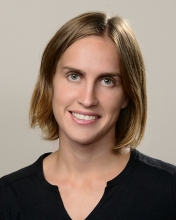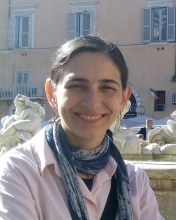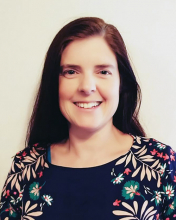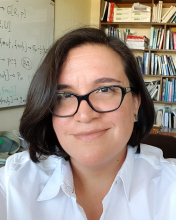The Simons Emmy Noether Fellows Program at Perimeter honours the legacy of Emmy Noether, a brilliant researcher whose work made profound impacts on the landscape of physics and mathematics.
The fellowships recognize outstanding early- and mid-career women scientists and provide targeted support intended to advance their research careers. Fellows can spend up to a year of uninterrupted research time immersed in Perimeter’s collaborative research environment. The program provides flexible logistical supports to ensure researchers can make the most of their scientific stay, including teaching buyouts with their home institutions and assistance with accommodations and childcare.
This year’s cohort features four Fellows who are ready to make breakthroughs in a breadth of physics fields. At present, their planned visits have been deferred one year owing to the ongoing pandemic. Meanwhile, we welcome them to join and engage with Perimeter’s research community from afar.
Here are the 2020/21 Simons Emmy Noether Fellows:
Laura Bernard is a researcher with the French National Centre for Scientific Research at the Laboratory for the Universe and Theory (LUTH) at the Paris Observatory. She is a theoretical physicist specializing in relativistic gravitation and gravitational waves, with a particular interest in perturbative methods in general relativity as well as in alternative theories of gravity. Previously a postdoctoral researcher at Perimeter and returning as a Simons Emmy Noether Fellow, Bernard aims to explore the promise of effective field theory in building generic gravitational waveforms for modified theories of gravity.
Selected papers by Laura Bernard:
• Challenges to global solutions in Horndeski’s theory
• Dynamics of compact binary systems in scalar-tensor theories: I. Equations of motion to the third post-Newtonian order
• Center-of-mass equations of motion and conserved integrals of compact binary systems at the fourth post-Newtonian order
Isabel Cordero-Carriόn is a professor in the Department of Mathematics at the University of Valencia in Spain whose work focuses on applied mathematics and astrophysics, with a special interest in numerical relativity and gravitational waves. Cordero-Carrión is a member of the international Virgo Collaboration group in Valencia, where she also coordinates outreach and communication activities. She is further involved in outreach as coordinator of the “Art & Science” working group of the International Gravitational Wave Outreach Group and as the science communication manager of “A network for Gravitational Waves, Geophysics and Machine Learning” (funded by the European Cooperation in Science and Technology). She serves on the Board of the Spanish Society of Gravitation and Relativity and the Editorial Board of the Journal of Physics Communications. At Perimeter, Cordero-Carrión plans to work on constrained formulations of general relativity and their numerical resolutions, the extraction of the gravitational radiation from several systems, and numerical approaches to deal with spacetimes containing singularities such as black holes.
Selected papers by Isabel Cordero-Carriόn:
• Improved constrained scheme for the Einstein equations: an approach to the uniqueness issue
• BSSN equations in spherical coordinates without regularization: vacuum and non-vacuum spherically symmetric spacetimes
• Excision scheme for black holes in constrained evolution formulations: spherically symmetric case
• On the equivalence between the Scheduled Relaxation Jacobi method and Richardson's non-stationary method
Sarah Croke is a senior lecturer at the School of Physics and Astronomy at the University of Glasgow. Previously a postdoctoral researcher at Perimeter, and later a PSI Fellow, Croke’s interdisciplinary research lays at the boundary between physics, mathematics, and theoretical computer science. Her primary interest is in the theory of quantum measurement, but she has also contributed to areas including quantum security, foundations of physics, quantum algorithms, and quantum thermodynamics. She is a member of the Institute of Physics and a Fellow of the Higher Education Academy. Fittingly, Croke aims to spend her time as a Simons Emmy Noether Fellow exploring generalizations of Emmy Noether’s famous theorem. In particular, Noether’s theorem provides a deep link between symmetries of a physical system and conserved quantities. While at Perimeter, Croke proposes to apply insights from quantum measurement theory to explore novel symmetry transformations in quantum mechanics, and corresponding conserved quantities. Her work is further supported by a Leverhulme Research Fellowship.
Selected papers by Sarah Croke:
• Is coherence catalytic?
• Optimal discrimination of single-qubit mixed states
• PT-symmetric Hamiltonians and their application in quantum information
• Streaming universal distortion-free entanglement concentration
Maria Elena Tejeda-Yeomans is a theoretical physicist based at Universidad de Colima. Her recent research has focused on the interactions of quarks and gluons in extreme conditions – high temperatures, densities, and strong magnetic fields – similar to those in relativistic heavy-ion collisions or in the early universe. As a Simons Emmy Noether Fellow, Tejeda-Yeomans aims to use perturbative and non-perturbative quantum chromodynamics (QCD) techniques within the theoretical frameworks used to study quarks and gluons under these extreme conditions.
Selected papers by Maria Elena Tejeda-Yeomans:
• Centrality dependence of photon yield and elliptic flow from gluon fusion and splitting induced by magnetic fields in relativistic heavy-ion collisions
• Spinor helicity methods in high-energy factorization: efficient momentum-space calculations in the Color Glass Condensate formalism
• Finite temperature quark-gluon vertex with a magnetic field in the Hard Thermal Loop approximation
• Multiloop amplitudes and resummation
The Simons Foundation’s mission is to advance the frontiers of research in mathematics and the basic sciences. Co-founded in New York City by Jim and Marilyn Simons, the foundation exists to support basic — or discovery-driven — scientific research undertaken in the pursuit of understanding the phenomena of our world. The Simons Foundation Mathematics and Physical Sciences division supports research in mathematics, theoretical physics, and theoretical computer science by providing funding for individuals, institutions, and science infrastructure.
About PI
Perimeter Institute is the world’s largest research hub devoted to theoretical physics. The independent Institute was founded in 1999 to foster breakthroughs in the fundamental understanding of our universe, from the smallest particles to the entire cosmos. Research at Perimeter is motivated by the understanding that fundamental science advances human knowledge and catalyzes innovation, and that today’s theoretical physics is tomorrow’s technology. Located in the Region of Waterloo, the not-for-profit Institute is a unique public-private endeavour, including the Governments of Ontario and Canada, that enables cutting-edge research, trains the next generation of scientific pioneers, and shares the power of physics through award-winning educational outreach and public engagement.
You might be interested in
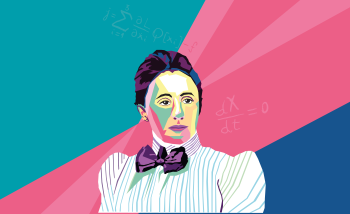
Eight new Simons Emmy Noether Fellows are ready to make waves
August 13, 2024


What is it like to be part of an underrepresented gender identity in physics?
February 9, 2024

